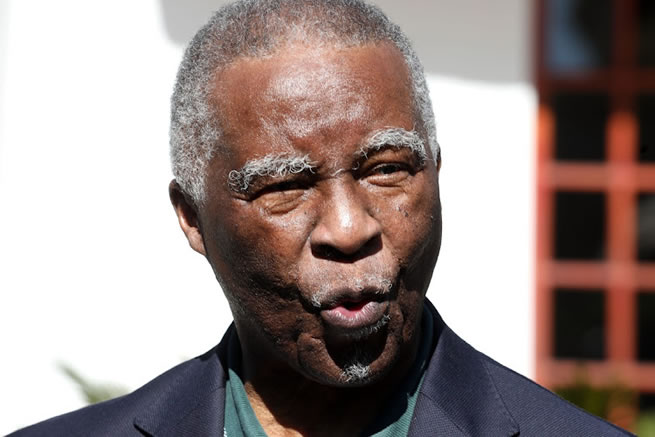Mbeki Condemns Operation Dudula, Warns Against Blaming Migrants for South Africa's Woes
JOHANNESBURG – Former President Thabo Mbeki has voiced his deep concern over the rise of Operation Dudula, stating that it pains him to witness the group blaming foreign nationals for South Africa's multifaceted problems. He emphasised that the nation's challenges cannot be simplistically attributed to migrants.
Speaking at a Thanksgiving event in Johannesburg on Saturday, marking the 15th anniversary of the Thabo Mbeki Foundation, Mbeki articulated his discomfort with the anti-immigrant sentiment propagated by groups like Operation Dudula.
"When I see things like Operation Dudula, it hurts. We can’t position ourselves as though we’re enemies of other Africans," he said, his words carrying the weight of his years in leadership and his commitment to pan-African ideals.
Mbeki didn't shy away from acknowledging the existence of problems within South Africa, but he firmly rejected the notion that these issues are solely the fault of those who have migrated to the country. "It’s not right. There are problems – problems we have got to solve in this country – and we can’t say those problems are caused by people who have migrated to South Africa. We have caused problems … But I’m saying that’s where we come from," he stated.
His remarks come against a backdrop of increasing unease surrounding the actions of Operation Dudula. The group has gained notoriety for its activities, which include monitoring public clinics and hospitals, primarily in Gauteng, to scrutinise the legal status of foreign nationals accessing South African healthcare services.
Operation Dudula, now a registered political party, has also extended its reach to public schools in Gauteng, where its members have reportedly cautioned principals against prioritising undocumented foreign nationals for enrolment in the 2026 academic year. Similar actions have been undertaken by the March and March Movement in KwaZulu-Natal, raising concerns about the potential for discrimination and xenophobia within the education system.
While some South Africans have expressed support for these groups, viewing them as a necessary response to the country's socio-economic challenges, others have criticised their methods as inhumane and divisive. The debate surrounding Operation Dudula and similar movements highlights the complex and often fraught relationship between South Africans and foreign nationals.
Mbeki also drew attention to the broader challenges facing the African continent, stating that there is much to be concerned about.
"There’s a lot to worry about. The stream of people who come to the foundation every day to discuss problems at home, on the continent, and beyond – asking what we can do," he said, underscoring the foundation's role as a platform for addressing critical issues.
He cited a recent meeting on peace and security in Africa, where representatives from the Democratic Republic of Congo (DRC) implored the foundation to assist in facilitating a national dialogue to address the country's multifaceted problems.
"One of the things that happened – and I give this as an example – was that there were a lot of Congolese in attendance, because the situation in the DRC was on the agenda," Mbeki explained. "We met them, and they said that when people outside the Congo look at their country, they see conflict in the east, which is true. But they said there are problems elsewhere too, and that to address them, they need a national dialogue among Congolese to come together and decide what to do."
He continued, "They said, ‘now, President Mbeki, do something about that.’ They were not requesting; they were insisting. We have since acted as they suggested. I can give many such examples of what the foundation is trying to do."
Mbeki lamented the ongoing conflicts and instability plaguing various parts of the continent, pointing to the dire situation in Sudan as a particularly concerning example. "Look at Sudan, you see terrible things happening both north and south, with no solution in sight. People come to the foundation and say, ‘Do something.’ I think it’s our responsibility; we can’t run away from that."
He stressed that South Africa is not alone in grappling with significant challenges and that a collective effort is needed to address the continent's pressing issues.
"The continent has got these huge problems. South Africa has got these huge problems. They need answers," Mbeki asserted.
He concluded by highlighting the positive feedback the foundation has received from across the continent, noting that it serves as a testament to its importance and impact. "One of the things that has been very moving and encouraging about the foundation, relative to the rest of the continent, is what people have said about it."
Mbeki's remarks serve as a powerful reminder of the importance of pan-African solidarity and the need to address South Africa's challenges in a way that is both effective and humane. His condemnation of Operation Dudula and his call for a more nuanced understanding of the country's problems are likely to resonate with many South Africans who are committed to building a more inclusive and just society. The debate surrounding immigration and the role of foreign nationals in South Africa is likely to continue, but Mbeki's intervention provides a valuable perspective that should not be ignored.

Follow Us on Twitter











